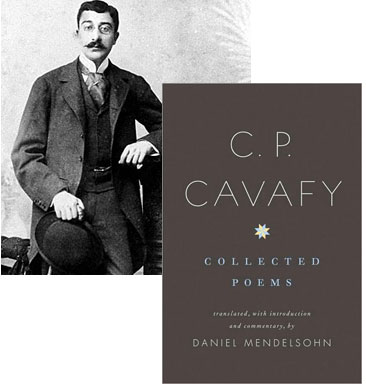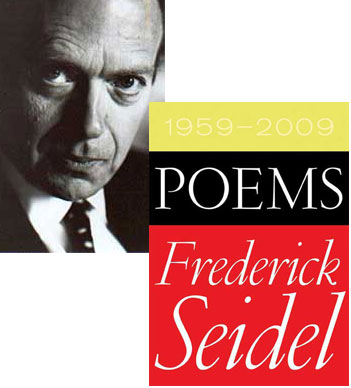C.P. Cavafy, “The Naval Battle”

We were annihilated there at Salamis.
Let us say oá, oá, oá, oá, oá, oá.
Ecbatana and Susa belong to us,
and Persepolis—the loveliest of places.
What were we doing there at Salamis
hauling our fleets and doing battle at sea?
Now we shall return to our Ecbatana
to our Persepolis, and to Susa.
We shall go, but shan’t enjoy them as once we did.
Otototoi, otototoi: this battle at sea,
why must it be, why must it be sought out?
Otototoi, otototoi: why must
we pick ourselves up, abandon everything,
and go there to do battle so wretchedly at sea.
Why is it thus: as soon as someone owns
illustrious Ecbatana, and Susa,
and Persepolis, he straightaway assembles a fleet
and goes forth to battle the Greeks at sea.
Ah yes, of course: let’s not say another word:
otototoi, otototoi, otototoi.
Ah yes, indeed: what’s left for us to say:
oá, oá, oá, oá, oá, oá.
I’m not 100% certain, but I think this Collected Poems, translated by Daniel Mendelsohn, is the third major translation of C.P. Cavafy‘s poems in the past decade; I first discovered his work through the versions Theo Theoharis published in 2001, and then Aliki Barnstone took a turn at them in 2006. (It’s been ages since I read the Theoharis, and I never did read the Barnstone, so I can’t tell you how they compare.) As part of its poem-a-day feature, Knopf has also put Mendelsohn’s translation of “On the Jetty” online, and the New York Review of Books has published Mendelsohn’s introduction to the collection.
Mendelsohn has also translated Cavafy’s unfinished fragments, like “It Must Have Been the Spirits” (from The New Yorker).
You may recognize Cavafy’s “Ithaka,” depending on how many weddings you’ve been to over the years; the more you attend, the better the odds you’ve heard it at least once. Here it is as read by Sean Connery, with an original soundtrack by Vangelis:
14 April 2009 | poetry |
Frederick Seidel, “The Big Golconda Diamond”

The Master Jeweler Joel Rosenthal, of the Bronx and Harvard,
Is Joel Arthur Rosenthal of JAR, place Vendôme.
The greatest jeweler of our time
Has brought to Florida from his afe
A big Golconda diamond that is matchless,
So purely truthful it is not for sale, Joel’s favorite, his Cordelia.
His mother in Florida can keep it
If she wants, and she doesn’t want.
Love is mounted on a fragile platinum wire
To make a ring not really suitable for daily wear.I wore the bonfire on a wire, on loan from Joel,
One sparkling morning long ago in Paris.
I followed it on my hand across the pont des Arts
Like Shakespeare in a trance starting the sonnet sequence.
As a recognition (or endorsement) of the cultural significance of the publication of Poems: 1959-2009, the New York Times Magazine ran a profile of Frederick Seidel last weekend; the magazine piece addresses, among other things, the long period of silence following his first publication, a silence he explains came about because he was afraid to confront “the expression of aspects of the self that you understand or, rather, that you fancy may not be attractively expressed or attractive once expressed.”
“Another way of talking about this is to talk about your becoming yourself: your finding who you are as a poet, finding what you sound like, finding your subjects that bring you out of you that are your subjects. It’s almost as if there’s a moment when you decide, Well, whatever the problem of writing this way, of writing these things, whatever the difficulty with presenting yourself this way . . . well, that’s it.“
Other Seidel poems include “Poem by the Bridge at Ten-shin” (from The New Yorker), “Prayer” (from Vallejo Nocturno), and “Ode to Spring” (from Poets.org). In addition, the Macmillan page dedicated to Seidel has several audio recordings of the poet reading from his work.
13 April 2009 | poetry |

 Our Endless and Proper Work is my new book with Belt Publishing about starting (and sticking to) a productive writing practice.
Our Endless and Proper Work is my new book with Belt Publishing about starting (and sticking to) a productive writing practice. 
